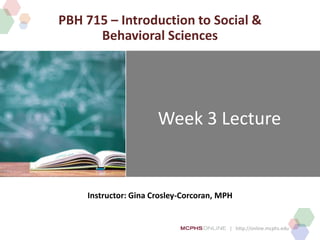
PBH.715 Week 3 Slides
- 1. | http://online.mcphs.edu Week 3 Lecture Instructor: Gina Crosley-Corcoran, MPH PBH 715 – Introduction to Social & Behavioral Sciences
- 2. | http://online.mcphs.edu BEHAVIORAL AND SOCIAL SCIENCE THEORY
- 3. | http://online.mcphs.edu Introduction In this section, we will discuss the differences between theories and models, identify examples of these theories and models at multiple levels and apply these to public health issues. Four broad theoretical traditions Social ecology Health promotion Interpretive studies Critical perspectives
- 4. | http://online.mcphs.edu Theory vs Model Theory • Set of interrelated concepts, constructs, and propositions that predict behaviors • Tend to encompass a broad domain • More formal • Multiple theories may be used to explain a behavior/set of behaviors at different levels Model • A heuristic device for organizing components of a domain to show relationships between parts and the outcome • Applied to more narrowly defined domains or behaviors • Less formal • Make tentative claims about causality
- 5. | http://online.mcphs.edu Theoretical Traditions in Public Health • Based upon the traditional public health model (host-agent environment) • Expanded to include social and cultural factors as key contributors to health issues • Social Ecology of Health Model Social ecology • Seeks to identify determinants and pathways of influence for • health-related behaviors • Focus on individual-level behavior change • Key construct is self-efficacy • Health Belief Model, Theory of Planned Behavior, Transtheoretical Model Health promotion
- 6. | http://online.mcphs.edu Theoretical Traditions in Public Health • Focus on subjective, perceptual, and cognitive dimensions of illness • Meanings are not correct/incorrect and can change based upon cognitive/social/cultural factors influencing the individual • Qualitative approach often using illness narratives • Theories from anthropology, sociology, psychology Interpretive studies • Challenge the dominant paradigms of public health practice and seek alternative approaches to improve health • Two approaches: political-economic and constructivist • Argue that ecological models accept the social status quo and do not challenge unequal distribution of resources Critical perspectives
- 7. | http://online.mcphs.edu Key Concepts of Theories and Models Knowledge and attitudes • Perceptions, attributions, attitudes, knowledge • Cognitive factors are easy to study and typically straightforward Health behavior • Development of reliable and valid measures of specific health behaviors or prediction of behaviors • Often conceptualized according to different stages of behavior Culture • Explores differences across not only health states but explanations for health/illness behaviors and perceptions Social environment • Social stress, social support, social networks, social capital
- 8. | http://online.mcphs.edu Intrapersonal-Level Models Cognitive models that focus on knowledge, attitudes, and perceptions Health Belief Model • Decisions to take action are based upon four factors: perceived susceptibility, perceived severity, perceived benefits, perceived barriers Theory of Planned Behavior • Intentional behavior is determined by three factors: attitude toward the behavior, subjective social norms, perceived behavioral control
- 9. | http://online.mcphs.edu Intrapersonal-Level Models Transtheoretical Model • Stage model of behavior change • People move through stages of decision-making from precontemplation to adoption of the health behavior change Self-Regulatory Models • Refers to the way in which people monitor their behavior and continually make changes to “regulate” their actions to achieve goals • Attempts to explain the factors that are important in this process
- 10. | http://online.mcphs.edu Interpersonal-Level Models Models and frameworks for understanding how social context influences health Social Support Theory • Seeks to explain the process of assistance provided through human relationships Social Cognitive Theory • Describes how social relationships influence cognitions and behavior in a reciprocal interaction
- 11. | http://online.mcphs.edu Organizational-Level Models Aids in understanding how complex public health agencies work and is useful in trying to plan programs involving these entities Diffusion of Innovation Theory New behaviors tend to be adopted in predictable stages that have predictable patterns Utilizes defined “types of adopters” to describe these patterns
- 12. | http://online.mcphs.edu Multi-Level Models Address distal, intermediate, and proximate factors Critical for understanding all types of health problems and for analysis of public health issues Biopsychosocial Model Designed to explain the interplay of biological and social factors in disease etiology Includes “layers” from genetic to global systems level While similar to the social ecology model, places greater emphasis on the biological basis of disease
- 13. | http://online.mcphs.edu HEALTH AND ILLNESS BEHAVIOR
- 14. | http://online.mcphs.edu Definitions of Health and Illness Behavior Health Behavior • Actions taken in the absence of observable illness • Includes primary prevention such as diet and exercise Illness Behavior • Designates help-seeking behavior • Includes consulting with health-care providers and engaging in self-care activities
- 15. | http://online.mcphs.edu Theories Historical Behaviorist Theories Attempts at understanding human behavior may have originated with Hippocrates Believed that behaviors corresponded to an over abundance of humors (blood, black bile, yellow bile, phlegm) Behaviorist Theories Ivan Pavlov (1927) credited with identifying origins of human behavior B.F. Skinner (1957) theory of “operating conditioning” – pairing a targeted behavior with reinforcement
- 16. | http://online.mcphs.edu Theories Cognitive Theories “personal thought processes that serve as frames of reference for organizing and evaluating experiences” – Gochman 1988, p 21 Social Cognitive Theory Idea that many of our thoughts and believes are rooted in observational learning experiences that have occurred in our environment Focus: behavior modeling
- 17. | http://online.mcphs.edu Week 3 Assignments Discussion Board Plagiarism Quiz Live Book Discussions